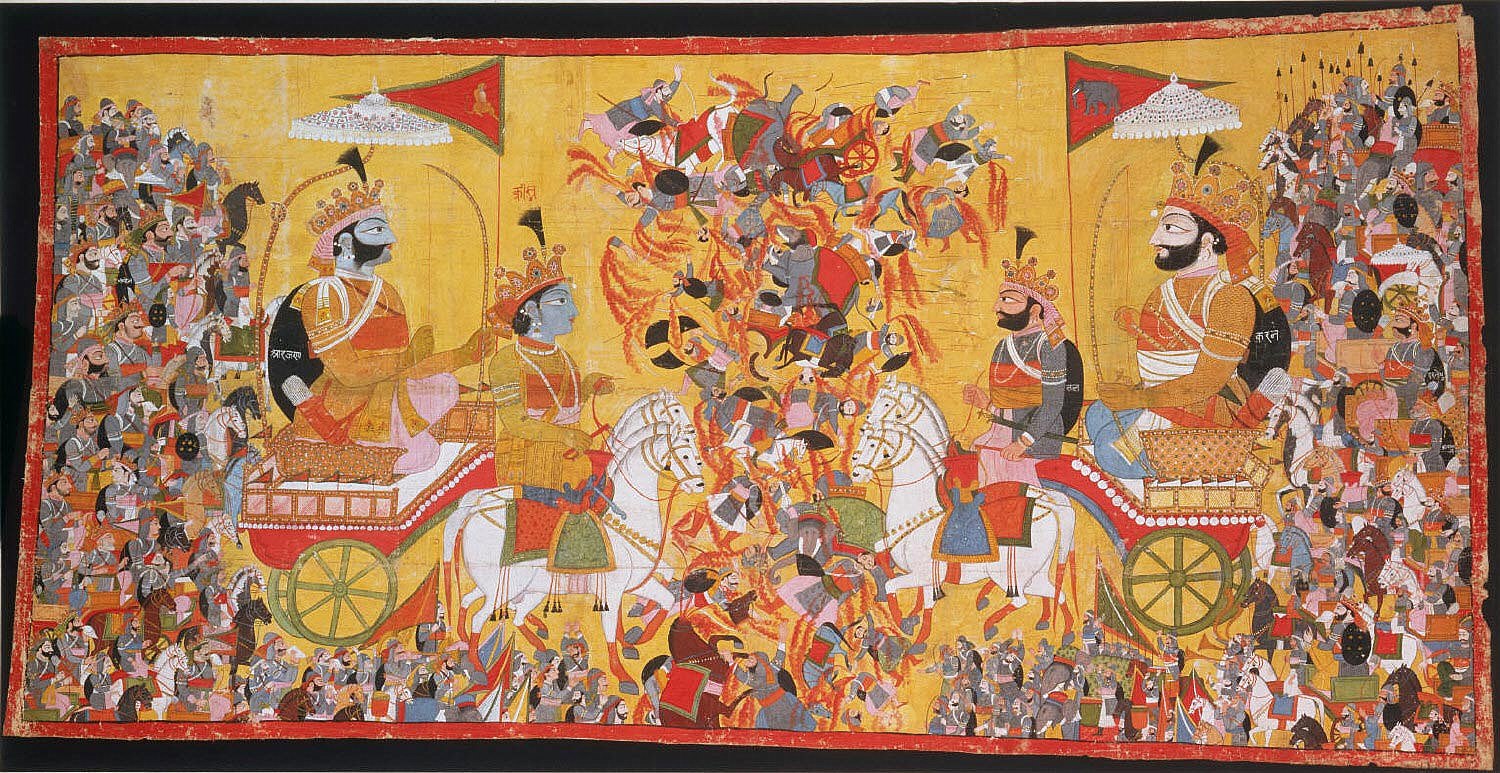महाभरत
Mahābharata
As retold by
Michael Dolan, B.V. Mahāyogi
|
| Sanskrit version of Mahabharata inscribed on palm leaves |
ASHVATTHAMA EXILED
Then Kṛṣṇa spoke saying “So be it. Mercy
is above justice. But his crimes must not go unpunished.
Arjuna?”
With a nod from Yudhiṣthira and Bhīma, the mighty Arjuna withdrew his razor-sharp sword. He cut
the sacred jewel from the forehead of Aśvatthāmā and shaved his brahminical top-knot. Thit this, that son
of a brahmaṇa lost all luster and mystic power. His humiliation was worse than death.
Now, the lotus-eyed Kṛṣṇa held his sudarṣana-chakra
and fixed the wretched son of Droṇa with his glance and said:
“As for you: sinful wretch.
Killer of children. Coward. The rules of
war forbid such awful murder. No warrior kills a child or sleeping foe. You do
deserve to die for your foul crimes. And still the fire-born Draupadī
pleads your cause. Enough blood has been shed. So to your sentence: For your
foul deeds, slaying men and children in their sleep, let all men know you for a
coward. May your name, Aśvatthāmā, be a synonym for coward, monster and wretch.
“
And Krishna cursed him, saying, “May you
wander the planet for 3,000 years alone and hated by all. O wretch, you shall
have no home, no comfort. The stench of blood and pus shall emanate from your
vile body forever. Dark forests and parched deserts shall be your abode. You
are exiled to wander the earth, O sinner, cursed by plagues and misfortunes.”
| Bas Relief of Mahabharat War, Angkor Wat |
And with this the foul Aśvatthāmā,
whose jewel had been sundered from his head by the powerful Arjuna - was cursed
to walk the earth in exile for thousands of years. Driven from the battlefield,
powerless and impotent, by both vultures and vermin. Even Rakshasas recoiled at
his foul smell as he vainly sought refuge in the dark forests.
The mighty Bhīmasena gave Draupadī the gem plucked from the head of the cruel Ashvatthama
and said, “This jewel is yours, my lady. Rise, O black-eyed lady of Panchala,
and leave your grieving. Now, Duryodhana has been slain, and all the kings who
opposed our cause have been laid to rest. The envious princes who tormented the
earth with their arms lie dead on these plains, their souls dispatched to
heaven or hell. And the hope of the dynasty, Parikṣit, is safe in the womb of Uttara. Behold we have torn this gem from the
sinful head of Droṇa’s son.” And so saying, he handed the shining jewel to
Draupadī.
 |
| Kurukshetra War. Traditional Painting, Rajasthan |
Then Draupadī, rising from her
grief turned to her husband, the noble Yudhiṣthira, and said: “This gem was
torn from the head of Droṇa’s son, for he was unworthy. But Droṇa was your
guru, your master. He taught you the use of weapons and how to rule. And so it
is fitting that you take this jewel upon your head, my Lord, for it has great
mystic power. My vow of vengeance is satisfied. I want no more blood.”
| Draupadi insulted |
And so saying, Draupadī returned
the gem to her husband Yudhisthira the king, fixing it on his brow, where it began to glow a deep
green.
The Pandavas watched as the cursed Aśvatthāmā wandered
away from the battlefield, and slowly entered the forest to live out his exile.
And finally, the lotus-eyed Kṛṣṇa, seated on his war chariot
decked in gold spoke to the lady Uttara as follows:
“Your child, the heroic Parikṣit,
attaining to age and a knowledge of the Vedas as well as the practice of pious
vows, shall obtain all weapons from the son of Sharadvata. This righteous king
shall rule for sixty years, and shall hear the knowledge of the Bhagavata from
Shukadeva, the son of Vyāsa. This boy shall become the mighty-armed king of the
Kurus. He shall be known as Parikṣit, who passed the test of fire.
| Pariksit Maharaj hearing Bhagavat from Shukadev |
Getting better and better
ReplyDelete